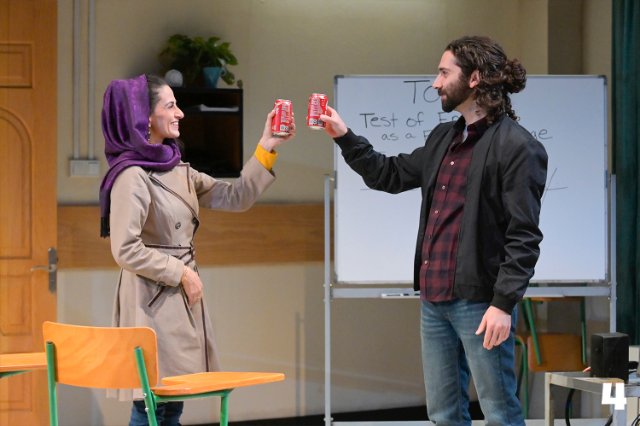English
Adult Iranians Struggle with Unexpected Social and Cultural Issues Involved in Learning English
By: Victor Cordell - Apr 08, 2023
English has gained the distinction of being the world’s most sought-after language. It is the official language in more countries with advanced economies than any other. It is the dominant lingua franca and sometimes official language of international business, international law, diplomacy, tourism, air traffic control, post-graduate educational materials, international conferences, global entertainment, and more. English-speaking countries are the most desired targets for immigration – legal and undocumented.
Born to immigrant parents, Iranian-American playwright Sanaz Toossi looks at a part of the global industry that has derived from the ubiquitous nature of English – teaching English to non-native speakers. Calling upon her own heritage to generate a narrative, her incisive dramedy “English” won both the Lucille Lortel and Obie awards for best new play in 2022. Berkeley Rep presents a nicely produced and acted version of the work, intelligently directed by Mina Morita, that is worth seeing. Yet, as well-crafted and revelatory as the script is, it lacks a wow factor.
Set in Karaj, Iran in 2008 at a private facility, four adult, advanced English learners comprise a class designed to prepare attendees for the TOEFL (Test of English as a Foreign Language) exam, which is used as a benchmark by over 11,000 institutions worldwide. The teacher is Marjan, who had spent nine years in the U.K., but she has returned to Iran. The students vary in age, gender, and motivation for taking the course. Some have more specific reasons, like an older woman, Roya, who plans to join her son and his family in Canada and a younger woman, the sometimes fractious Elham, aspiring to medical school in Australia. The bubbly Goli simply wants to open new doors, while the goal of Omid, the only male and an accomplished English-speaker, is a mystery.
Classroom exchanges provide many humorous moments as students stumble along with fractured language. Activities provide fun as well - imitating Christiane Amanpour in a role playing interview; a recitation of “Mary Had a Little Lamb;” a show-and-tell of a pencil; and a recurring tossing of a ball in a categories game.
But the dark underside has two elements. One is that characters begin to clash. Personality and behavioral differences arise in addition to open questioning about why individuals are there and whether they will be able to accomplish their goals. Self-searching sets in. The other, and more intriguing aspect, is the unearthing of the many unsettling issues of learning and speaking in a new language. At the tip of the iceberg is inability to express oneself as precisely as in the mother tongue, and the effect that has on self-confidence and personality. As Roya notes, her son, with the Anglicized name Nate, seems a different person from one language to the other.
Toossi’s text is malleable, and for that reason demands adept actors. Although the playwright doesn’t intend it, it is easy to imagine the whole script being acted without a laugh. But this cast cleverly extracts humor from everyday conversation, especially in the early going before conflicts among the characters emerge.
Because of the nature of the topic and setting, the script requires that a fair bit of Farsi be spoken. One solution is that the actors could speak those lines in Farsi. The drawbacks are that actors need to speak Farsi or be able to learn enough to mimic it; that the audience would have to read supertitles; and that some humor might be lost when spoken in a foreign language. The somewhat confusing solution chosen is that when a character is supposedly speaking Farci, they speak in unaccented English, whereas, when speaking English, they have Iranian accents. This solves the drawbacks. Dialect Coach Ana Bayat has done a wonderful job, even coaching stronger and lesser accents among the characters. However, it is sometimes difficult for the audience to know which language is being spoken, especially early on, before the device is understood.
Perhaps the greatest thematic weakness of the piece is that the stakes are small, which diminishes the consequences of dramatic situations that occur and possibly the viewer’s emotional involvement with some characters. Although the TOEFL exam represents a significant hurdle, not all students take the course or the exam with a specific purpose in mind. What’s more, it can be retaken. The applicant to Australian medical school had already taken it several times previously.
The single set staging is very effective, while the ensemble acting is solid. At the center is the almost always smiling Sahar Bibiyan who skillfully conveys her empathy as Marjan, yet she displays subtlety in her wariness and does have her limits. Mehry Eslaminia excels in the juiciest role as Elham. The most assertive and candid of the students, she jokes and whines and faces big obstacles in reaching English proficiency. In all, "English" engages for its full 100 minutes.
“English,” written by Sanaz Toossi, is produced by Berkeley Repertory Theatre and plays on their stage at 2025 Addison Street, Berkeley, CA through May 7, 2023.




